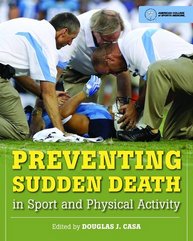 Alarming headlines surrounding sport-related deaths in recent media coverage has prompted national discussion regarding the causes of these conditions and how to prevent them. Dr. Douglas J. Casa, Ph.D., ATC, FACSM, FTNATA, a professor of kinesiology in the Neag School of Education and COO of the Korey Stringer Institute, jumped on board regarding the pressing issue by publishing the first book of its kind, called Preventing Sudden Death in Sport and Physical Activity.
Alarming headlines surrounding sport-related deaths in recent media coverage has prompted national discussion regarding the causes of these conditions and how to prevent them. Dr. Douglas J. Casa, Ph.D., ATC, FACSM, FTNATA, a professor of kinesiology in the Neag School of Education and COO of the Korey Stringer Institute, jumped on board regarding the pressing issue by publishing the first book of its kind, called Preventing Sudden Death in Sport and Physical Activity.
The text, published in cooperation with the American College of Sports Medicine (ACSM), examines the causes (such as heat stroke, head injuries, cardiac issues, exertional sickling, etc.) of particular sport-related deaths with each chapter written by a clinician and a scientist, both of whom are experts in the content area. With the application of real life case studies, Dr. Casa explores a wide variety of topics and specific scenarios in which sport-related deaths could have been avoided.
“On August 8, 1985, somewhere between 11:00 and 11:10 p.m. EST, the path of my life unfurled in front of me,” said Dr. Casa. “I have nearly no memory of approximately six hours of my life, while I was in a coma, due to the severe exertional heat stroke while running a 10K race. For all the years since then, I have been on a quest to try and prevent and treat exertional heat stroke. While exertional heat stroke is one of the most common fatalities related to sports, it certainly is not the only one.”
The topics covered in the book range from asthma and diabetes to lightning, traumatic injury and cervical spine injuries. Many faculty members and graduate students from the Neag School of Education played integral roles in this publication release including Lawrence Armstrong, PhD; Stephanie Mazerolle, PhD; ATC, Jeff Anderson, MD; Tutita Casa, PhD; Rebecca Stearns, MA, ATC; Kelly Pagnotta, MA, ATC and Julie DeMartini, MA, ATC.
“This book is the culmination of the efforts of over 30 of the most respected sports medicine professionals and scientists in the world related to preventing sudden death in sports. It is another chance to recognize my gift of survival and pay it forward with information about the top 10 causes of death in sport that can assist in creating more survival stories. I have experienced a wide array of emotions in my life, but no feeling is greater than playing a role in saving a life,” said Dr. Casa.
For more information about the book, contact Dr. Casa at douglas.casa@uconn.edu or check out the Korey Stringer Institute’s website at http://Ksi.uconn.edu/.
 Facebook
Facebook
 Twitter
Twitter
 LinkedIn
LinkedIn
